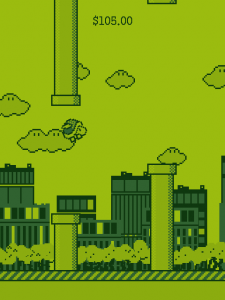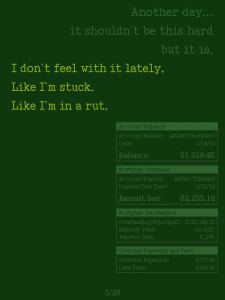Indie Rock: Flapping Bird
- Updated: 8th Oct, 2014
I’m pounding away at a ridiculous mug of coffee in order to write this. I’m exhausted from nearly a week without a break from my day job and I’ve still got another 7 days before I’m taking any real time off. That’s the perfect mindframe to talk about Flapping Bird, a game about the diminishing enjoyment gained from a career-focused existence from a protagonist who’s reached middle-age and feels like all they’re doing in life is chipping away at mortgage debt. Yippee.
Wearing the simplistic mechanics of the ever imitable Flappy Bird and the aesthetics of a Gameboy title, Flapping Bird is a series of metaphorical days with the lead character jumping between time flapping through pipes (doing their day job) to a text screen having a bit of a moan about the state of their lives (literally that. that part isn’t a metaphor).
It’s better than Flappy Bird. Because fuck Flappy Bird. Flappy Bird was a game about a bird that flapped and you tried to get as far as possible so you could show off a big number to your friends. Flapping Bird is a game about whether flapping is even worthwhile when you stop caring all that much about why you’re flapping at all. It’s a game much better at mixing its intent with its mechanics. Why are you a bird in Flappy Bird? Why not literally anything else?
 Why not display the heart rate monitor of someone trying to stay alive for as long as possible? Then there’s a quantifiable reason to carry on and go further. As it stands, Flappy Bird is just a game about a bird that flaps. I don’t like that. I like what it does with its simplistic mechanics leading to high stress, I don’t like what it is.
Why not display the heart rate monitor of someone trying to stay alive for as long as possible? Then there’s a quantifiable reason to carry on and go further. As it stands, Flappy Bird is just a game about a bird that flaps. I don’t like that. I like what it does with its simplistic mechanics leading to high stress, I don’t like what it is.
My favourite thing about the way Flappy Bird plays is that falling is a constant. It’s important that the passive state of Flappy Bird is that you’re moving downward unless you make an active effort in order to move upward. It’s easy to translate that to the feeling that you’re being dragged down by just being alive. And that’s what Flapping Bird has done! Wowee!
The original game didn’t capitalise on the falling because that wasn’t what it was about. Flapping Bird is about better contextualising those mechanics into something that actually matters. Your natural state in that game is to feel overworked and shitty and you’ve got to find your own way to pull yourself back up. But you’re being constantly reminded that you don’t particularly have any reason to.
Flappy Bird counts the amount of Pipes that you’re able to pass through as a method of scoring. Flapping Bird doesn’t much care. The amount of work you do is unimportant to its aims, it’s the amount of money you bring in (symbolised by the coins dotted around the map) that actually holds value in its systems. It’s cool too that the money doesn’t have any impact on the narrative. Whatever you bring in will have little impact on the mood of the protagonist. That’s a great instance of intentional conflict between the game’s verbs and the wants of the lead character.
 Maybe, like me, you’ll get to a point where you stop playing with any real attempt to achieve and just start hammering into the first pipe you see in order to progress the story along. I’d normally say that’s shitty incentivising but actually it’s really cool! You start to give about as much of a shit about what you’re doing as the protagonist. You’re bored and tired too, and instead of a negative, that’s the game working as intended!
Maybe, like me, you’ll get to a point where you stop playing with any real attempt to achieve and just start hammering into the first pipe you see in order to progress the story along. I’d normally say that’s shitty incentivising but actually it’s really cool! You start to give about as much of a shit about what you’re doing as the protagonist. You’re bored and tired too, and instead of a negative, that’s the game working as intended!
I like Flapping Bird a lot! It’s a great extension of an idea with a lot of great mechanical weight but not much context or narrative and it’s given it some. Well done, Flapping Bird.

Follow Us!